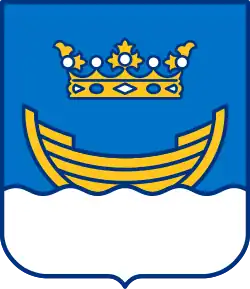Holy Trinity Church, Helsinki
The Holy Trinity Church (Finnish: Pyhän Kolminaisuuden kirkko, Swedish: Heliga Treenighetskyrkan, Russian: Свято-Троицкая церковь) is a Finnish Orthodox Church located in the Kruununhaka district of Helsinki, on the corner of Unioninkatu and Rauhankatu. The church was built in the neo-classical style in 1826 under the direction of the architect Carl Ludvig Engel, and was dedicated and opened in the following year.[1][2] The Holy Trinity services the city's orthodox community with Divine Liturgy held in both Church Slavic and Finnish.[3]
| Holy Trinity Church | |
|---|---|
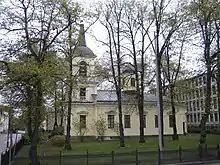 | |
| Location | Helsinki |
| Country | Finland |
| Denomination | Eastern Orthodox |
| Website | hos |
| History | |
| Consecrated | 1827 |
| Architecture | |
| Functional status | Active |
| Architect(s) | Carl Ludvig Engel |
| Administration | |
| Diocese | Helsinki |
| Parish | Helsinki Orthodox |
The church is Helsinki's oldest Orthodox church.[4] When Finland became 1808 autonomic Grand Duchy of Finland, a number of Russian civil servants, merchants and soldiers moved to Helsinki. They needed a place for worship, and the czar supported their efforts to get a church. In the 21st century, many of the churchgoers still speak Russian, but majority of them are immigrants born in the Soviet Union.[5]
Gallery
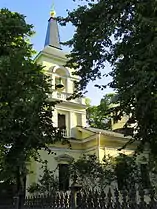 Bell tower
Bell tower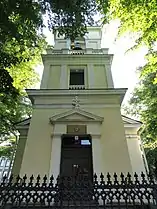 Front
Front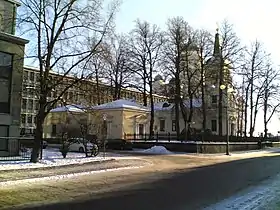 From the northern side, with Helsinki Cathedral in the background
From the northern side, with Helsinki Cathedral in the background
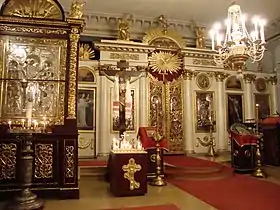
References
- Holy Trinity Church, Helsinki
- "Pyhän Kolminaisuuden kirkko; Kirkkokatu 17 & Unioninkatu 31 & Rauhankatu 18; Helsinki". Finna. Helsinki City Museum. Retrieved 9 November 2016.
- "Pyhän Kolminaisuuden Kirkko" (in Finnish). Helsinki Orthodox Parish. Archived from the original on 10 November 2016. Retrieved 9 November 2016.
- "Holy Trinity Church". Visit Helsinki. Retrieved 9 November 2016.
- "Seurakunta tutuksi". Ortodoksiviesti (in Finnish). Helsinki Orthodox Parish. 2011. Retrieved 9 November 2016.
External links
- Holy Trinity Church, Helsinki (Homepage).
 Media related to Holy Trinity Church (Helsinki) at Wikimedia Commons
Media related to Holy Trinity Church (Helsinki) at Wikimedia Commons
